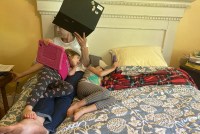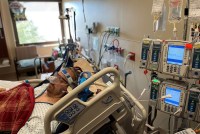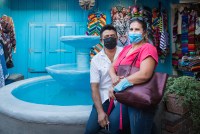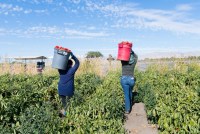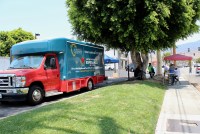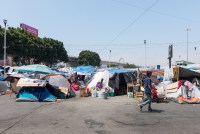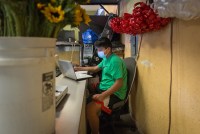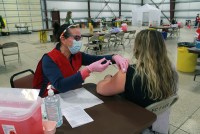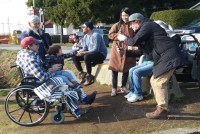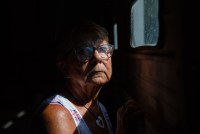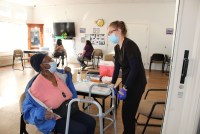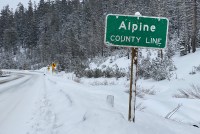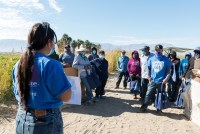Latest KFF Health News Stories
Our Covid Cocoon: The Parents Aren’t Alright (But Help May Be Coming)
After experiencing multiple quarantines and school closures in less than two months, covid vaccine approvals for 5- to 11-year-olds can’t come soon enough for a KHN editor in Montana.
ICUs Are Filled With Covid — And Regret
Unvaccinated people are filling intensive care beds and dying of covid in record numbers in Tennessee and other Southern states. Many tell their nurses and doctors they regret the decision not to get the vaccine when they could.
Voters in Tight Recall Race Sound Off on California Gov. Newsom’s Covid Leadership
Democratic Gov. Gavin Newsom’s pandemic policies are effectively on California’s Sept. 14 recall ballot — and the electorate views them with a mix of resentment, gratitude and disillusionment.
Temperaturas extremas aumentan los riesgos de salud de los trabajadores agrícolas
El calor es la principal causa de muerte relacionada con el clima en los Estados Unidos. Entre 1992 y 2017, el estrés por calor mató a 815 trabajadores estadounidenses y lesionó gravemente a más de 70,000, según la Oficina de Estadísticas Laborales.
As Temperatures Rise, So Do the Health Risks for California’s Farmworkers
Workers who harvest crops ranging from grapes to cauliflower in the Coachella Valley are accustomed to temperatures well over 100 degrees Fahrenheit. This summer the thermometer has already hit 122, and heatstroke is becoming more common.
In Rural America, Twisting Arms to Take a Covid Vaccine First Takes Trust
In communities across the country, the Cooperative Extension System, the same organization that supports 4-H clubs nationally, is tapping its roots in rural communities to promote vaccines. But its approach to getting people vaccinated in many communities, including Cairo, Illinois, must be nuanced.
‘The Vaccination Queen’: Nurse Practitioner Takes Covid Shots House to House in Puerto Rico
Abigail Matos-Pagán, a critical care expert who has galvanized relief efforts after hurricanes and earthquakes, is on a mission to inoculate as many Puerto Rican residents as possible.
“La reina de la vacunación”: enfermera lleva las dosis contra covid de casa en casa en Puerto Rico
Abigail Matos-Pagán, experta en cuidados críticos que ha impulsado tareas de ayuda tras huracanes y terremotos, se ha propuesto vacunar al mayor número posible de residentes de Puerto Rico.
Want Fries With That Vaccine? Even at a Fast-Food Restaurant, Pop-Up Clinics See Slow Traffic
At a pop-up vaccine clinic in a McDonald’s parking lot in the city of San Bernardino, fewer than two dozen people agreed to get a shot, offering a snapshot of the faltering vaccination effort.
Grab Your Mask and Notepad, We’re Headed Back to California’s State Capitol
After being mostly closed to the public and the press for more than a year, California’s state Capitol is open again — masks, temperature checks, covid outbreaks and all.
‘It’s a Mission’: Volunteers Treat Refugees Massing at the Border
A growing number of Mexican and Central American migrants are trying to cross into the U.S. at the southern border. Volunteers at one free clinic in Tijuana tend to the health needs of migrants waiting for their immigration cases to come up — and simply trying to survive in packed and dangerous encampments.
If You Are Vaccinated, You Can Dance the Night Away
After being closed for 14 months because of the pandemic, a North Carolina nightclub reopens. But now, in addition to showing an ID to gain entry, patrons also must show their vaccination cards.
Covid Fears Keep Many Latino Kids out of Classrooms
Latinos got hit disproportionately hard by covid-19. When faced with the choice of sending their kids back to school or keeping them in online classes, many Latino parents say their kids are safer at home.
El miedo a covid mantiene a muchos niños latinos fuera de las aulas
En California, los latinos constituyen el 39% de la población del estado, pero representan el 47% de las muertes por covid, según el Departamento de Salud Pública estatal. A nivel nacional, su riesgo de morir por covid es 2,3 veces mayor que el de los blancos no hispanos.
What the Slowing Vaccine Rates Mean for One Rural Montana County
In one northwestern Montana county where demand for covid vaccines is dropping well before widespread immunity is reached, people are split on whether the virus is a threat.
Battle Brews Over Neutral Zone Where Border-Crossing Parties Rendezvous, Risking Infection
Peace Arch Park on the U.S.-Canadian border has become a rare place where families and friends on either side of the border can see one another in person. But it raises questions on covid safety as the two countries handle the pandemic differently.
‘It Didn’t Really Stick With Me’: Understanding the Rural Shrug Over Covid and Vaccines
Fort Scott, Kansas, was hit hard by the pandemic, and it no longer has a hospital. But residents remain skeptical about the impact of the coronavirus.
Vaccines Go Mobile to Keep Seniors From Slipping Through the Cracks
A strike team of nurses and others is vaccinating Contra Costa County’s hardest-hit populations right where they live.
California’s Smallest County Makes Big Vaccination Gains
In rural Alpine County, where snowbound mountain passes isolate small towns, distributing the covid vaccine is a community effort. Unlike in many urban areas where residents jockey for limited appointments, the pace of vaccinations here is strong and steady.
Dispelling Vaccine Misinformation and Myths in California’s Breadbasket
Even though farmworkers are vulnerable to covid, many hesitate to get the vaccine, worried the shot could have severe side effects or signal their whereabouts to immigration officials. Immigrant advocates in the Coachella Valley and other farming regions are visiting workers to try to allay their fears.



